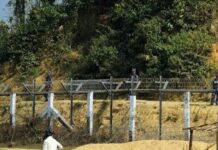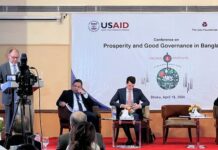Development frenzy hits Maheskhali hard
 Investment is pouring into Maheskhali, all the way from China, the US, South Korea, Malaysia, Japan and Thailand. There is a frenzy of development all over, forests are being torn down and hills being razed to give way to roads, power plants, industries and more. The island is hardly recognisable anymore.
Investment is pouring into Maheskhali, all the way from China, the US, South Korea, Malaysia, Japan and Thailand. There is a frenzy of development all over, forests are being torn down and hills being razed to give way to roads, power plants, industries and more. The island is hardly recognisable anymore.
Maheskhali, the island located in northwest Cox’s Bazar, has been hit by this wave of development. A seaport is being constructed on the adjoining island Matarbari, changing the entire appearance of the area. A visit to Maheskhali in December last year and May this year revealed the mega development that has hit Maheskhali hard.
As we settled down at a tea stall in Maheskhali’s Chaliatali Bazar, a middle-aged man rushed forward. Seeing our note pads and camera, he asked, “Are you journalists?”
Affirming that we were media men, he sat down and vented his anger and frustration. “We are the original inhabitants of this island, of the Nath community, yet we are not being able to live on our own island. Huge roads are being constructed, hills are being razed to the ground, forests are being destroyed. We are losing our homes.”
This was Subhash Nath, whose forefathers had settled here in this region centuries ago. He was joined by Nurul Islam, Akram Hossain and others. They all had the same anger. Their livelihood depended on cultivating betel leaf, salt, shrimps, bhetki fish and crabs. But with the deluge of development that has descended upon the island, their land and homesteads were all being acquired by the government.
The government will be acquiring 24 homesteads of Subhash and his relatives in the village Uttar Nalbila of Maheskhali. A road will be constructed there. A non-government organisation has listed the affected families and has said that the government will provide compensation. But the people simply do not want to leave their hearth and homes.
Most of Maheskhali upazila is an island and is dotted by a large number of shrimp, bhetki and crab farms. There are salt plants and betel leaf plantations. Bangladesh had an estimated annual demand of 2.7 million tonnes of salt and almost half of this comes from Maheskhali. The rest comes from around Cox’s Bazar too.
But as we proceeded along, the scene began to change. The range of hills along Uttarbila used to be covered in dense forest. The area now is swarming with trucks and all sorts of excavation equipment. Hills are giving way to roads and gas pipe lines are snaking their way through the landscape. What is happening to this area, the only forest island of the country?
Frenzy of development
The island is comprised of 86,000 acres of land. Last November Bangladesh Economic Zone Authority (BEZA) submitted a proposal to acquire 19,500 acres. And a bit less than half that amount is being acquired by four companies under the power, energy and mineral resources ministry.
In the first week of June last year, an official of BEZA told Prothom Alo, on condition of anonymity, that BEZA’s land acquisition had already been been increased to 27,000 acres and the process to take over the land was on.
Under the government’s power-related master plan, by 2041 the highest number of power plants would be set up in Maheskhali – 12 coal-fired power plants, 1 wind turbine power plant and two solar powered. An LNG (liquefied natural gas) land terminal would also be established there.
Bangladesh Petroleum Corporation (BPC)’s Eastern Refinery is setting up their largest oil depot on this island. A company of Petrobangla, GTCL, is constructing the Maheskhali and Anwara gas supply line in the region.
BEZA is constructing five economic zones on one-tenth of the island. The process is on to acquire land for three of these zones. Heavy industries will be set up also with residential complexes for the officers and workers.
Two coal-fired power plants are already underway in Matarbari, Maheskhali, under the Bay of Bengal Industrial Growth Belt (Big B), a part of the economic cooperation with Japan. Construction of a seaport is underway too, aiming to begin operations by 2024.
Why the focus on Maheskhali? BEZA chairman Paban Chowdhury said, this is one of the important locations for Bangladesh’s promising economic future. The sea is 18 metres deep near the coast here, where it is 10 metres deep off the Chittagong Port, 7 to 8 metres deep off Mongla. Vessels cannot anchor in close proximity to those two ports.
Speaking to Prothom Alo, Paban Chowdhury said, large vessels will be able to berth at the Matarbari seaport. This will facilitate bringing in machinery and coal for the power plants and also facilitate export of the heavy industry products. Secretary of the environment, forest and climate change ministry Abdullah Al Mohsin Chowdhury told Prothom Alo, there will invariably be a certain amount of damage to the environment for any large infrastructure construction. There will have to be an environmental impact assessment (EIA) for every project.
The power, energy and mineral resources ministry provided the Bangladesh Environmental Lawyers Association (BELA) with certain documents regarding the BPC project, but refused to provide the EIA papers, on grounds of the risk of these papers being misused.
Near Maheskhali, there is also a flurry of activity for industries and tourism projects at Kutubdia and Sonadia island. Water resources secretary Kabir Bin Anwar commented to Prothom Alo that Maheskhali is the only hilly forest island and has the rare combination of sweet and salt water. It is a haven of biodiversity. It would have been better not to take up so much industrialisation here, he said.
Chairman of the think tank Power and Participation Research Centre (PPRC), Hossain Zillur Rahman, told Prothom Alo, “Bangladesh needs big projects for development, but in implementing this, the rights of the local people are often not taken into cognizance. Nature and environment are being destroyed. But all over the world, these factors are taken into consideration when implementing large projects. If not, all sorts of complications arise and project costs go up. The environment is destroyed. A large number of projects are being taken up in Maheskhali at simultaneously and that is why the risks are higher.”
Hills being razed to the ground
Over a hundred trucks daily cross through the broad road near Nalbila Bazar. Work is on for the Eastern Refinery oil deport and for a pipeline to bring in the oil from the sea.
Hills were razed to the ground to make way for this road. A local man literally dragged us along, saying, “This is nothing. You must see how the hills have been destroyed.” He pointed to a range of hills, half of which had been cut away. Giant excavators had reared their heads to continue with this destruction.
Eviction pressure
The few houses near the hills had been marked in red for acquisition. The residents said they had been asked to leave and were under pressure from the Awami League-backed union parishad chairman and his people. One of them said that they had even threatened to abduct his daughter. This correspondent’s phone calls to the chairman remain unanswered.
There is a small market next to the under-construction Matarbari power plant. Chatting with three young local men at a tea stall there, it was learnt that their salt fields had been taken over for the power plant. Mohammed Hossain said, “I had to pay 30 per cent in bribes just to get the compensation. I used the compensation money to get a job in Qatar, but was cheated and lost everything.”
The tea stall owner Abid Hossain said, “Everyone is gradually leaving the area. Many are going to Sitakunda to work in the ship breaking yards there.”
On our way back we stopped at Chaliatali Bazar again, where Subhash Nath and others were waiting at the tea stall. Subhash said, “Every year thousands of people come to worship at the Adinath temple here. Will all this be lost to development? Is not protecting our religion and our livelihoods a part of development?”
As we were talking, a group of young men arrived on their motorcycles, menacingly surrounding our microbus. One of the men at the tea stall urgently whispered to us, “These are the contractor’s people and can create trouble. Leave, quickly leave.”
* This report appeared in the print edition of Prothom Alo and has been rewritten in English by Ayesha Kabir









